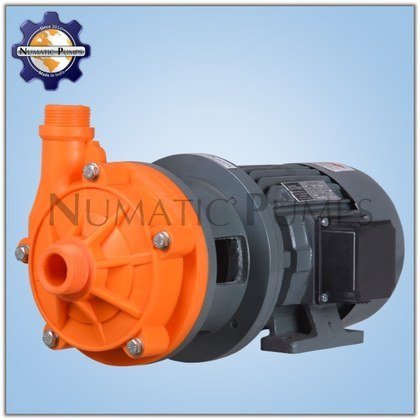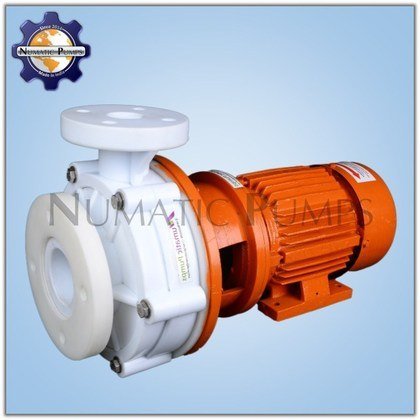PP Monoblock Pumps
PP Monoblock Pumps
Numatic Pumps has been established in the year 2014 is dedicated to Manufacturing and Dealing of all Type of Industrial Pumps used in Acid and Corrosive Chemicals Like HCL Hyrochloric Acid, Sulphuric Acid H2SO4. The Type of Pumps are Monoblock Pumps, Closed Coupled Centrifugal Pumps, Magnetic Driven Pumps, Dairy & Sanitary Pumps, Motorised Barrel Pumps, Pneumatic Drum Pumps, Diaphragm Pumps, Dosing Pumps, Fuel Pumps, Self Priming Pumps, Screw Pumps Etc..
Our High Running Product range includes solid injection moulded Polypropylene (PP) & Glass Filled Polypropylene (GFP) pumps, Polymer-Lined Pumps with Lining materials etc. In India we are very specialized in Manufacturing and Supplying of PP, PVDF & PTFE Lined Pumps, having a unique application for highly corrosive and high temperature media which is almost competitive to Hast-B, Hast-C and Alloy-20. Metallic Pumps, Magnetic Driven Sealless Pumps are the latest addition to our product repertoire to offer solutions to almost any pumping services, under one roof.
Hydrochloric Acid Transfer Pumps
The chemical Hydrochloric Acid is extremely corrosive. Hydrochloric Acid is an acid that cannot be used with metal components. Containment and chemical compatibility are the two most important factors to consider while handling Hydrochloric Acid. Chemical compatibility is a common source of confinement.
Hydrochloric acid Transfer Pumps are specialised pumps. There should be no metal parts in contact with the media or the acid. A Non-Metalic Pump should be used to transport hydrochloric acid. In just a few hours, every metal that comes into touch with Hydrochloric Acid becomes contaminated. Hydrochloric acid is corrosive to metals in particular. Metals like aluminium, cast iron, and even some stainless steels are inappropriate for hydrochloric acid since they will erode the material severely. When greater temperatures and pressures are necessary, metals are utilised with hydrochloric acid. Hastelloy-C and Titanium are common metals used to handle hydrochloric acid at lower concentrations and Hastelloy-C at higher temperatures. Although these metals may withstand powerful acids, they are corrosion-resistant. Because of the predicted corrosive wear, many pumps are designed with a limited life cycle. For certain pumps, this might be as short as a few months since, regardless of the material used, the pump will eventually fail.
The acid hydrochloric acid is extremely corrosive. This acid is commonly formed during the chlorination of organic chemicals. The concentration of these acids ranges from dilute solutions to fuming types at around 40% HCL. Each year, approximately 20 million tonnes of hydrochloric acid are produced, making it an important chemical for a variety of processes. It is produced both by chemical manufacturers and as a byproduct of other processes on-site.
Hydrochloric Acid Transfer Pump Applications and Usage:
Where contaminants react with the hydrochloric acid in the fluid, such as in circulation applications, the pump may experience an exponential rate of corrosion due to the particles being oxidised. The chlorination of organic compounds results in the production of hydrochloric acid. These acids are available in a variety of concentrations, ranging from weak solutions to fuming versions containing roughly 40% HCL. Each year, over 20 million tonnes of hydrochloric acid are generated, making it a critical chemical in a variety of processes. Chemical factories generate it, as well as onsite as a byproduct of other operations. Hence a special Hydrochloric Acid Pump are design to tackel all the corrosion chalanges.
Hydrochloric Acid Pumps are commonly used in:
* Steel pickling, Hydrochloric Acid removes iron oxide and scale from metal surfaces before further processing, such as coating.
* Hydrochloric Acid is used to recover crude oil by injecting it into rock and cleaning the well of contaminants.
* Many food ingredients, such as corn syrup, gelatine, sauces, and preservatives, are made with hydrochloric acid.
* The production of leather products and PVC material.
* The production of household cleaning products.
* The production of organic and inorganic compounds in wastewater treatment, polymers, and battery manufacturing.
Magnetic Drive Pump for HCL Acid transfer
PP Magnetic Drive Pumps which are Sealless Pumps are the finest choice for pumping Hydrochloric Acid at ambient temperature, whereas PVDF Magnetic Drive Pumps are excellent for temperatures above 80 degrees Celsius. Because Magnetic Drive Sealless Pumps are Non-Metallic Pumps, there is no alternative option for Hydrochloric Acid. As we all know, hydrochloric acid is very corrosive, and no metal can withstand it for more than a few hours.
Hydrochloric HCL Acid propertries and Suitable Materials:
The Chemical Hydrochloric Acid is extremely corrosive. This acid is frequently generated during the chlorination of organic compounds. HCL Acids come in a variety of concentrations, from weak solutions to fuming kinds with around 40% HCL. Where contaminants react with the hydrochloric acid in the fluid, such as in circulation applications, the pump may experience an exponential rate of corrosion due to the particles being oxidised. Hydrochloric Acid is generated in large quantities each year, making it a significant chemical in a variety of activities. Chemical firms create it, as well as onsite as a byproduct of other operations. Containment and chemical compatibility are the two most important factors to consider while handling Hydrochloric Acid.
Hydrochloric acid is corrosive to metals in particular. Aluminium, cast iron, and even some stainless steels are inappropriate for HCL Acid because they will severely corrode them. When greater temperatures and pressures are necessary, metals are employed with Hydrochloric Acid.
Hastelloy-C and Titanium are common metals used to handle Hydrochloric Acid at lower concentrations and Hastelloy-C at higher temperatures. Although these metals may withstand powerful acids, they are not corrosion resistant. Because of the predicted corrosive wear, many pumps are designed with a limited life cycle. For certain pumps, this might be as short as a few months since, regardless of the material used, the pump will eventually fail. Pumps made of Polypropylene (PP) Magnetic Drive Pump which are Sealless Pumps are highly recommended for ambient temperatures. PVDF Magnetic Drive Pumps are recommended for temperatures between 70 and 100 degrees.
Types of Hydrochloric Acid Transfer Pumps
There are several types of pumps that can be used for transferring hydrochloric acid, including diaphragm pumps, centrifugal pumps, and peristaltic pumps.
Diaphragm pumps are positive displacement pumps that use a flexible diaphragm to pump the fluid. These pumps are often used for low-flow applications and are available in a range of materials of construction, including plastic, stainless steel, and Hastelloy.
Centrifugal pumps, on the other hand, use a rotating impeller to move the fluid. These pumps are more commonly used for high-flow applications and are also available in a range of materials of construction.
Peristaltic pumps, also known as hose pumps, use a flexible tube to move the fluid. These pumps are often used for low-flow applications and are available in a range of materials of construction.
Factors to Consider When Selecting a Hydrochloric Acid Transfer Pump
When selecting a hydrochloric acid transfer pump, it’s important to consider several factors to ensure the pump can safely and effectively handle the acid.
Acid Concentration and Temperature
The concentration and temperature of the acid being transferred will impact the type of pump and materials of construction required. Hydrochloric acid is commonly available in concentrations ranging from 10% to 37%, and temperatures can range from ambient to high temperatures.
For low-concentration and ambient-temperature applications, plastic pumps may be suitable. However, for high-concentration and high-temperature applications, pumps made from more corrosion-resistant materials such as stainless steel or Hastelloy may be required.
Flow Rate
The flow rate of the acid being transferred will also impact the type of pump required. Centrifugal pumps are generally better suited for high-flow applications, while diaphragm and peristaltic pumps are better suited for low-flow applications.
Materials of Construction
The materials of construction of the pump must be compatible with hydrochloric acid to prevent damage to the pump and contamination of the acid. Materials commonly used for hydrochloric acid transfer pumps include:
Plastics: Polypropylene and PVDF (polyvinylidene fluoride) are commonly used for low-concentration and ambient-temperature applications.
Stainless Steel: Stainless steel pumps are commonly used for higher-concentration and higher-temperature applications.
Hastelloy: Hastelloy pumps are highly resistant to corrosion and are often used for highly concentrated hydrochloric acid and high-temperature applications.
Best Practices for Safe Handling of Hydrochloric Acid
In addition to selecting the appropriate hydrochloric acid transfer pump, there are several best practices that should be followed to ensure safe handling of hydrochloric acid.
Personal Protective Equipment
All personnel handling hydrochloric acid should wear appropriate personal protective equipment (PPE), including gloves, safety goggles, and a face shield. In addition, clothing made from materials such as PVC or neoprene can provide additional protection against splashes.
Ventilation
Hydrochloric acid can release toxic fumes, so adequate ventilation is critical. The work area should be well-ventilated, and local exhaust ventilation should be used when transferring the acid.
Emergency Response Plan
An emergency response plan should be in place in case of accidental exposure or spillage of hydrochlor.
Hydrochloric Acid Transfer Pumps what is used for?
Hydrochloric acid transfer pumps are used to safely transfer hydrochloric acid from one container or location to another. Hydrochloric acid is a highly corrosive and reactive chemical, and therefore it requires specialized equipment to handle it safely. The pumps are used in a variety of industries such as chemical manufacturing, wastewater treatment, and mining, where hydrochloric acid is commonly used for processes such as pH adjustment, metal extraction, and cleaning. The type of pump selected depends on the specific application and the amount of acid that needs to be transferred.
Thank you for visiting our website and your interest in our products and services. If you have any further questions or would like more detailed please feel free to contact us.
HCL Hydrochloric Acid Transfer Pumps are commonly used in:
Numatic Pumps offers a wide range of pumps for the chemical Hydrochloric Acid (Muriatic Acid). Numatic Pumps has a pump for HCL Hydrochloric Acid (Muriatic Acid) for any application, ranging from 5 LPM to 2500 LPM. It is recommended to use a centrifugal sealless magnetic drive chemical pump made of Polypropylene or Kynar Plastic, Encapsulated Impeller, and Carbon or Mica Teflon Bushing when pumping the chemical Hydrochloric Acid (Muriatic Acid) at room temperature.
HCL Hydrochloric acid is a highly corrosive solution of hydrogen chloride in water. It is a clear and colourless inorganic acid with numerous applications in various industries. It is naturally present in gastric acid. Because it was originally made from green vitriol and rock salt, and later from sulfuric acid and common salt, it was known as spirits of salt, muriatic acid, and acidum salis. Depending on the concentration and temperature, the chemical Hydrochloric Acid (Muriatic Acid) can also be heavy. If the specific gravity is greater than 1.1, a trimmed impeller is required to avoid decoupling or overloading the motor. Higher concentrations and temperatures of the chemical HCL Hydrochloric Acid, either together or separately, may render the pumps listed above ineffective. Regardless of the temperature or concentration, it is strongly advised that you contact a local Numatic Pumps distributor directly to review your application before ordering a pump. On a global scale, 20 million tonnes of hydrochloric acid are produced each year. It is used in the manufacture of PVC plastic, polyurethane, household detergents, and food.
HCL Hydrochloric Acid Transfer Pumps
Hydrochloric acid, also known as HCl, is a common compound that has a wide range of applications. The same compound that actively works to break down the food that people digest is also used in the production of everyday products such as batteries, fertilisers, and other materials that we use on a daily basis. When looking for the best chemical pump for hydrochloric acid, keep its application in mind. Our Pump’s experts have extensive knowledge of chemical pumps and processing to assist clients in selecting the best pump for the job. Clients can always find what they need for their specific business or industrial challenges with these extensive chemical pump offerings that can accommodate diverse chemicals, combined with our team of chemical pump experts.




